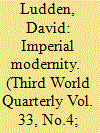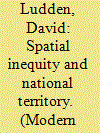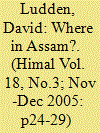| Srl | Item |
| 1 |
ID:
047986


|
|
|
|
|
| Publication |
Cambridge, Cambridge University Press, 1999.
|
| Description |
xiii, 261p.
|
| Series |
The Cambridge history of India
|
| Standard Number |
0512364248
|
|
|
|
|
|
|
|
|
|
|
|
Copies: C:1/I:0,R:0,Q:0
Circulation
| Accession# | Call# | Current Location | Status | Policy | Location |
| 042374 | 954/LUD 042374 | Main | On Shelf | General | |
|
|
|
|
| 2 |
ID:
152617


|
|
|
|
|
| Summary/Abstract |
The forceful expropriation of land, labour, water, and other productive resources is fundamental for processes of agricultural expansion and intensification. What is known today as ‘land grab’ was theorized by Marx as ‘primitive accumulation’ and by David Harvey as ‘accumulation by dispossession’. Today it is most prominent and controversial in Africa, where the governments of India and China are major perpetrators; and it also drives most contemporary urban expansion in India and China. This article deploys David Washbrook's idea of ‘country politics’ to explore the process of land grabbing in the early-modern expansion of agrarian Bengal, where local peasant society and worldwide imperial political economy came together to expand frontiers of farming in what is now the Sylhet District of Bangladesh.
|
|
|
|
|
|
|
|
|
|
|
|
|
|
|
|
| 3 |
ID:
113093


|
|
|
|
|
| Publication |
2012.
|
| Summary/Abstract |
In the recently generalised historical coincidence of neoliberal free-market policy trends with accelerating global economic growth and inequality, India and China stand out as world regions with distinctive histories of imperial inequity. The rise of Asia shows that globalisation does not work the same way everywhere. In Asia historical dynamics of imperial territorialism generate inequities that fit global patterns through their absorption and mediation of capitalism. Economic reforms that brought Asia into global leadership ranks express imperial forms of power, authority, and inequity whose long histories need to be understood to make sense of Asia and global capitalism today. This article focuses particularly on India.
|
|
|
|
|
|
|
|
|
|
|
|
|
|
|
|
| 4 |
ID:
067555


|
|
|
|
|
| Publication |
Oxford, Oneworld Publications, 2006.
|
| Description |
xii, 306p.Pbk
|
| Standard Number |
1851682376
|
|
|
|
|
|
|
|
|
|
|
|
Copies: C:1/I:0,R:0,Q:0
Circulation
| Accession# | Call# | Current Location | Status | Policy | Location |
| 050604 | 915.4034/LUD 050604 | Main | On Shelf | General | |
|
|
|
|
| 5 |
ID:
112478


|
|
|
|
|
| Publication |
2012.
|
| Summary/Abstract |
In 1905, Viceroy Nathaniel Curzon applied well-worn principles of imperial order to reorganize northeastern regions of British India, bringing the entire Meghna-Brahmaputra river basin into one new administrative territory: the province of Eastern Bengal and Assam. He thereby launched modern territorial politics in South Asia by provoking an expansive and ultimately victorious nationalist agitation to unify Bengal and protect India's territorial integrity. This movement and its economic programme (swadeshi) expressed Indian nationalist opposition to imperial inequity. It established a permanent spatial frame for Indian national thought. It also expressed and naturalized spatial inequity inside India, which was increasing at the time under economic globalization. Spatial inequities in the political economy of uneven development have animated territorial politics in South Asia ever since. A century later, another acceleration of globalization is again increasing spatial inequity, again destabilizing territorial order, as nationalists naturalize spatial inequity in national territory and conflicts erupt from the experience of living in disadvantaged places. Remapping 1905 in the long twentieth century which connects these two periods of globalization, spanning eras of empire and nation, reveals spatial dynamics of modernity concealed by national maps and brings to light a transnational history of spatial inequity shared by Bangladesh and Northeast India.
|
|
|
|
|
|
|
|
|
|
|
|
|
|
|
|
| 6 |
ID:
066818


|
|
|